University of Geneva
| Université de Genève | |
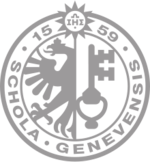 | |
| Latin: Schola Genevensis | |
| Motto | Post tenebras lux (Latin) |
|---|---|
Motto in English | Light after darkness |
| Type | Public university |
| Established | 1559[1] |
| Rector | Prof. Yves Flückiger (since 2015) |
Administrative staff | approx. 5.600 |
| Students | 14,489 |
| Location | Geneva, Switzerland |
| Campus | Urban |
| Affiliations |
Coimbra Group LERU EUA IFPU |
| Website | www.unige.ch |
 | |
The University of Geneva (French: Université de Genève) is a public research university located in Geneva, Switzerland. It was founded in 1559 by John Calvin as a theological seminary and law school.[1] It remained focused on theology until the 17th century, when it became a center for Enlightenment scholarship. In 1873, it dropped its religious affiliations and became officially secular.[2] Today, the university is the second-largest university in Switzerland by number of students.[3] In 2009, the University of Geneva celebrated the 450th anniversary of its founding.[4] At least 40% of the students come from foreign countries.
UNIGE has academic research and development programs in various fields that are represented through various faculties such as:
- Faculty of Sciences
- Faculty of Medicine
- Faculty of Humanities
- Faculty Geneva School of Economics and Management (GSEM)
- Faculty Geneva School of Social Sciences (G3S)
- Faculty of Law (Geneva Law School)
- Faculty of Protestant Theology
- Faculty of Psychology and Education
- Faculty of Translation and Interpreting
The university holds and actively pursues teaching, research, and community service as its primary objectives. In 2015, it was ranked 58th worldwide by the Shanghai ranking. In 2011, it was ranked 73rd worldwide by the Academic Ranking of World Universities, and 69th in the QS World University Rankings.[5]
UNIGE is a member of the League of European Research Universities (including academic institutions such as Amsterdam, Cambridge, Heidelberg, Helsinki and Milan) the Coimbra Group and the European University Association.[6]
Location
The University of Geneva is located in several districts in the eastern part of the city and in the nearby city of Carouge (on the left bank of the Lake Léman and the Rhône), and the different buildings are sometimes very distant from each other (the Battelle buildings are for instance more than three kilometers away from the Bastions). The oldest building (1559) is the Collège Calvin, and is not anymore a university building. Lectures are given in six different main locations, Les Bastions, Uni Dufour, Sciences I, II and III, Uni Mail and Uni Pignon, Centre Médical Universitaire (CMU), and Battelle;[7] as well as in other less important locations (for instance the Mathematics Section is located at the second and (partly) third and sixth storeys rented by the university in an office building in Carouge).[8]
Uni Bastions
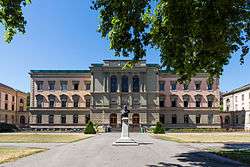
Built between 1868 and 1871, Uni Bastions is the symbol of Geneva's academic life. It is located in the middle of a park and is host to the faculty of Protestant Theology and to the Faculty of Arts.[9]
Uni Dufour
Its architecture was inspired by Le Corbusier. It hosts the Rectorat and the administration of the University.[10]

Uni Mail
It is Switzerland's biggest building dedicated to social sciences. Uni Mail symbolizes the modernity of the University of Geneva. Its architecture is defined by a great transparency and open spaces. It currently hosts the Faculty of Law, of Economics and Social Sciences, of Psychology and Education and the Faculty of Translation and Interpreting.[11]
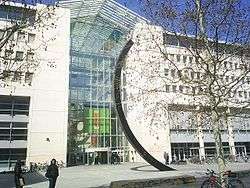
Organisation
The University of Geneva is structured in various faculties which are representing teaching, research and service to society in the various disciplines.
Faculties
The University is composed of nine faculties:[12] The university has a partnership with the nearby Graduate Institute of International and Development Studies and the Bossey Ecumenical Institute, and students at the university may take courses at these institutes.
Faculty of Medicine
Founded in 1876, ranked one of the top 100 medical schools in the world (#60 in 2015 according to the QS University Rankings, Shanghai, China), both in terms of teaching and medical research.[13] It is one of the larger faculties of the University of Geneva in terms of budget and number of employees. Notable research areas include neuroscience, genetics, and transplantation. It is closely associated with Switzerland's largest hospital complex, the University Hospitals of Geneva (HUG).
The University Medical Center (CMU)
Since 1981, the Faculty of Medicine is located in the buildings of CMU in Champel. The premises of CMU helped equip Fundamental Medicine of an environment conducive to the development of research, using advanced technical means and structures promoting interdepartmental interactions and synergies. To this end, the Faculty of Medicine provides its employees, but also scientists and university hospital institutions in the Lake Geneva region, twenty highly specialized technical platforms.[14]
Faculty of Humanities
The faculty of Humanities and Arts has various departments and research centers.
Faculty Geneva School of Economics and Management (GSEM)
GSEM is a new faculty and exists since January 2014. The creation of the GSEM faculty is a result of a merger between two former departments: Economics and HEC. Students of the GSEM Faculty benefit from a bachelor's degree in English and French which brings together the principal disciplines they need to master in a core curriculum. This new curriculum is in place since fall 2015. The GSEM counts more than 1.700 students (Bachelor and Master) and 200 lecturers. The Executive Education counts more than 1.500 participants and over 45 programs (including an Executive MBA (EMBA) and International Organizations MBA (IOMBA). A number of research institutes provide avenues for graduate studies at Master’s and Doctoral levels.
Faculty Geneva School of Social Sciences (G3S)
The Faculty Geneva School of Social Sciences (G3S), was founded on 1 January 2014. The Faculty of Social Sciences promotes social commitment in the sense of a more sustainable and equitable development, the reduction of social inequalities, including gender, promotion of institutions and more participatory political forms and respectful Justice and differences.
The Faculty of Social Sciences is based on several pillars - sociology, political science, geography, political economy - and recognized thematic centers of excellence - the economic and social history, gender studies, communication, socio-economics, territorial development, analysis of social and political institutions, the study of living and social vulnerability courses, the study of international relations, and citizenship. But while promoting research and advanced education in the diversity of its constituent fields, our faculty aims to become a laboratory for cross-disciplinary knowledge and articulation of the world of knowledge and the world of action.
Faculty of Psychology and School of Education
The faculty was created in 1890. It has various departments and several research centers.
Faculty of Translation and Interpreting
The Faculty of Translation and Interpreting (FTI) is one of the oldest translation and interpreting education and research institutions in the world.
Interfaculty centers
- Art-Law Centre[15]
- Institute for Reformation History (the Reformation)
- Computer Science Department (computer science)
- University Centre for Study of Energy Problems (energy policy)
- The European Institute of the University of Geneva (European studies, European integration)
- Interfaculty Center of Gerontology (gerontology)
- Swiss Center for Affective Sciences (affective science)
- Center for Environmental Studies
- Geneva Finance Research Institute
- Geneva Academy of International Humanitarian Law and Human Rights
Associated institutions
- Campus Biotech
- Swiss National Supercomputing Centre
- Center for Biomedical Imaging (CIBM)[16]
- University Centre of Legal Medicine (CURML)[17]
- Institut universitaire romand de santé au travail (IST)[18]
- École romande de santé publique (ERSP)
- Kurt Bösch Institute (IUKB)
Finances
The University of Geneva had for 2013 a budget of CHF 558,211,000. It mostly comes from the cantonal subventions, the other notable contributors being the federal state and the tuition fees.[19]
Libraries and press
Libraries
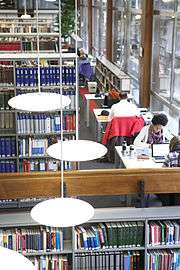
UNIGE's library facilities are spread across four sites.
Uni Arve is host to seven libraries: the Bibliothèque Ernst & Lucie Schmidheiny, the Bibliothèque d'Anthropologie, the Bibliothèque du Centre universitaire d'informatique, the Bibliothèque Georges de Rham (Mathematics), the Bibliothèque de l'Institut des Sciences de l'environnement (ISE), Bibliothèque de l'Observatoire (Astronomy) and the Bibliothèque des Sciences de la Terre et de l'environnement.[20]
Uni Bastions hosts the language libraries, as well as the university's libraries focused on history and musicology.[21]
Uni CMU is home to an extensive collection of medical issues. Besides, it is also hosts the Centre de documentation en santé (CDS) and the Bibliothèque de l’Institut de la médecine et de la santé et de l’Institut d’éthique biomédicale (IHMS - IEB).[22]
Uni Mail's collection is focused on the following themes: Economics and social sciences, Law, Psychology and Learning Sciences, Translation and Interpreting, European studies, French as a foreign language and Musicology. Besides, it also hosts UNIGE's multimedia library.[23]
Press
The journal de l'UNIGE is released biweekly. Its purpose is to ease communication inside the university, to inform the students about the research being carried at UNIGE, to convey new opinions and to inform students and teachers of upcoming university events via l'Agenda.[24]
Campus is released monthly with the objective to ease communication between the scientific community and the citizens and to be a "bridge between science and city".[25]
Academics
Admission and fees
To be enrolled in a bachelor programme, one must hold a Swiss maturity diploma or a secondary diploma considered by the University of Geneva to be equivalent.[26] If the degree was not pursued in French, applicants must pass an eliminatory French language test at the beginning of September, which consists of an oral and a written comprehension test and of a piece of argumentative writing.[27] Tuition fees are of CHF 500 per semester.
Academic year
UNIGE's academic year runs from mid-September to mid-June. It is divided in two semesters, each one being concluded by an examination session, held respectively at the beginning of January and at the beginning of June. An examination session is held at the end of August and beginning of September as a retake for students who failed their January or June examinations.[28]
During the three days before the start of the new academic year, the Journées d'accueil (Welcome Days) are organized by the University to introduce the new students to the city and the facilities, tips are also given on how to succeed at university. A second chapter including city tours, outdoor concerts and animations is also organized by the student association UniAccueil (AUA) to celebrate the new academic year.[29]
Teaching and degrees
Before 2005, the University applied various very different models, depending on Faculties, and sometimes even on Departments (or "Sections"). Some Faculties applied the French education model of granting academic degrees, with some minor differences: demi-licence (two years), trois-quarts de licence (three years), licence (four years), diplôme d'études approfondies and diplôme d'études superieures spécialisées (DEA/DESS) (1–2 years), and doctorate (3–5 years).
The University now follows the requirements of the Bologna process: bachelor's (three years), master's (1–2 years), in some departments or sections Master of Advanced Studies (1–2 years), doctorate (3–5 years).[30]
UNIGE offers more than 240 types of diplomas: about 30 bachelor's degrees,[31] 70 masters and 78 doctorates. It also provides more than 200 programmes of continuing education in various sectors.[32]
Bachelor programs
Faculty of Sciences
- Bachelor of Science in Mathematics
- Bachelor of Science in Mathematics and Computer Science
- Bachelor of Science in Computer Science
- Bachelor of Science in Physics
- Bachelor of Science in Chemistry
- Bachelor of Science in Biochemistry
- Bachelor of Science Biology
- Bachelor of Science in Earth and Environmental Sciences
- Bachelor of Arts in Pharmacy
Faculty of Medicine
- Bachelor of Science in Human Medicine
Faculty Geneva School of Social Sciences (G3S)
- Bachelor of Geography and environment
- Bachelor of Political science
- Bachelor of Sociology
- Bachelor of History-economics-society
Faculty of Humanities
- Bachelor of Arts
Faculty Geneva School of Economics and Management (GSEM)
- Bachelor in Economics and Management (in English and French)
Faculty of Law
- Bachelor of Laws
Faculty of Theology
- Bachelor of Arts in Theology
Faculty of Psychology and Education
- Bachelor of Science in Psychology[33]
- Bachelor of Arts in Learning Sciences
Faculty of Translation and Interpreting
- Bachelor of Arts in Multilingual communication
Master programs
While all bachelor programs are taught in French (except in the Faculty GSEM), many master are programs are held in English, mostly in the fields of business and of science.[34]
Faculty Geneva School of Economics and Management (GSEM)
- Master of Science in Management (in English)
- Master of Arts in International Trading Commodity Finance and Shipping (in English)
- Master of Science in Wealth Management (in French and English)
- Master of Science in Economics (in English)
- Master of Science in Accounting, Controlling and Finance - in collaboration with University of Lausanne (in French)
- Master of Science in Statistics (in English)
Faculty Geneva School of Social Science (G3S)
- Master of Science in Territorial development
- Master of Science in Gender studies
- Master of Science in Cultural and Political Geography
- Master of Science in Cultural and Political Geography – specialization in economic history
- Master of Science in International Economic History
- Master of Science in International Economic History – specialization in geography
- Master of Science in Public management
- Master of Science in Political Science
- Master of Science in Journalism and Communication
- Master of Science in Environmental Science
- Master of Science in Socioeconomics
- Master of Science in Socioeconomics – specialization in demographics
- Master of Science in Sociology
- Master of Science in Standardization, Social Regulation and Sustainable Development
Executive Education programs
Faculty Geneva School of Economics and Management (GSEM Executive)
The organizational Unit for Executive Education (lifelong learning) of the faculty is called GSEM Executive (formerly it was called HEC Executive).
Master of Advances Studies (MAS)
- International Organizations Master in Business Administration - IOMBA (in English)
- Master in Management, ressources humaines et carrières (in French)
- Master in Management stratégique des institutions de santé (in French)
- Master in Business Administration - MBA en emploi (in French)
- Master in Business Administration - Executive MBA (in French and English)
- Master in Sécurité de l'information (in French)
- Master in Sports Administration and Technology (in English)
- Master in Stratégie et confiance numériques (in French)
- Master in Wealth Management (in English)
Diploma of Advances Studies (DAS)
- Diploma in Aviation Management (in English)
- Diploma in Business Administration & Management / 1st year MBA (in English and French)
- Diploma in Commodity Trading (in English)
- Diploma in Communication digitale, expertise web et réseaux sociaux (in French)
- Diploma in Contrôle de gestion (in French)
- Diploma in Corporate Social Responsibility (in English)
- Diploma in Entrepreneurship and Business Development (in English)
- Diploma in Gestion culturelle (in French)
- Diploma in Gestion d'entreprise (in French)
- Diploma in Gestion et management dans les organismes sans but lucratif (in French)
- Diploma in Gestion des risques d'entreprise (in French), in collaboration with HES-SO, Geneva School of Business Administration
- Diploma in International Management / 2nd year MBA (in English and French)
- Diploma in International Organizations Management (in English)
- Diploma in Management et administration des affaires / 1e année MBA (in French)
- Diploma in Management et administration des entreprises (in French)
- Diploma in Management des institutions de santé (in French)
- Diploma in Management des institutions sociales (in French)
- Diploma in Management de projets (in French)
- Diploma in Management, ressources humaines et carrières (in French)
- Diploma in Management stratégique achats, logistique et approvisionnements (in French)
- Diploma in Strategic Marketing (in English)
- Diploma in Sécurité de l'information (in French)
- Diploma in Stratégie marketing, communication et e-business (in French)
Certificate of Advanced Studies (CAS)
- Certificate in Modern Management for Non Profit Organizations (in English)
- Certificate in Analytical Marketing (in English)
- Certificate in Audit interne (Certification CIA) (in French)
- Certificate in Branding & Digital Marketing (in French)
- Certificate in Communication digitale et expertise web (in French)
- Certificate in Communication digitale et réseaux sociaux (in French)
- Certificate in Comptabilité Gestion Fiscalité (in French)
- Certificate in Corporate Social Responsibility (in English)
- Certificate in E-business et e-communication (in French)
- Certificate in Entrepreneurship & Business Development (in English)
- Certificate in Face aux risques: décider et intervenir (in French)
- Certificate in Gestion des carrières / Spécialisation du MAS GRH (in French)
- Certificate in Gestion quantitative de portefeuille (in French)
- Certificate in Human Resources Management in Humanitarian Settings (in French)
- Certificate in IFRS et IPSAS (in French)
- Certificate in International Organizations Management (in English)
- Certificate in Management de projets (in French)
- Certificate in Management de proximité des institutions de santé (in French)
- Certificate in Management des institutions sociales (in French)
- Certificate in Management humain / Spécialisation du MAS GRH (in French)
- Certificate in Ressources humaines / Spécialisation du MAS GRH (in French)
- Certificate in Sécurité de l'information (in French)
- Certificate in Stratégie marketing (in French)
International partnerships
Students at UNIGE have the possibility to study abroad for a semester or a year during their degree. Partner universities include Free University of Berlin, Harvard Law School, École Normale Supérieure, Trinity College Dublin, Erasmus University of Rotterdam, Université Libre de Bruxelles, King's College London, McGill University, HEC Montreal, University of Ottawa, University of Oxford, Uppsala University, Johns Hopkins University, University of Michigan, UCLA, University of Sydney, University of Tokyo.[35]
Research
The key sectors of research at the University of Geneva are sciences (molecular biology, bio-informatics, etc.), elementary physics, astrophysics, economics, social sociences, psychology, chemistry, biochemistry and biophysics.
UNIGE is home to six national research centers: in genetics (Frontiers in Genetics), in material sciences (MaNEP), in study of emotions (Affective Sciences), in chemical biology (with EPFL), in study of mental illness (Synaptic, with EPFL and Unil), in study of life path (with Unil). UNIGE also carries research in international studies since the creation in 2013 of the Global Studies Institute, in finance with the Geneva Finance Research Institute,[36] and in environmental studies, with the creation in 2009 of the Institut des sciences de l'environnement.[37]
Famous discoveries have been made by researcher working at UNIGE including the discoveries of extrasolar planets by Michel Mayor, of genetics by Denis Duboule, or of quantic teleportation by Nicolas Gisin.
Rankings
The University of Geneva is consistently ranked one of the top universities in the world.
Global rankings
In 2015, the University of Geneva is ranked 58th overall in the world according to the Shanghai Ranking. In 2012, it was ranked 69th overall in the world according to the Shanghai Ranking, 74th overall according to the QS ranking and 133rd overall according to the THE ranking. In 2006, Newsweek ranked the university 32nd in the world.[38]
The QS World University Rankings[39] ranked the University of Geneva as follows:
| Year | In Switzerland | In Europe | In the World |
|---|---|---|---|
| 2012 | - | - | 74th |
| 2011 | - | - | 69th |
The Times Higher Education World University Rankings[40] ranked the University of Geneva as follows:
| Year | In Switzerland | In Europe | In the World |
|---|---|---|---|
| 2012-2013 | 5th | 52nd | 133rd |
| 2011-2012 | 7th | 46th | 116th |
| 2010-2011 | 5th | 34th | 118th |
Subject rankings
In molecular biology, the impact of the research carried in Geneva was ranked 4th in Europe by Times Higher Education for the period 1999-2009, directly behind the University of Oxford.[41] In physics, UNIGE was ranked sixth.
The QS 2013 subject ranking placed the University of Geneva at the 21st place in the field of Pharmacy and at the 49th place in Philosophy. In every subject, the University was ranked in the world's top 200.[42]
Other rankings
In the 2013 QS ranking, the University was ranked 24th in world for most international faculty and 20th in the world for most international student body.[43]
Student body
In 2009-2010, 13,667 students were studying at UNIGE (14,489 students with the IHEID and IEB), of whom 61% were female, the highest female percentage in any Swiss university. 36% of the students were non-Swiss, originating from 131 countries. 3,574 teachers and collaborators, of whom 1,451 are female, are working for UNIGE.[44]
Student life
Sports
The Bureau des sports organizes all the sports related activity at UNIGE. Free sports lessons are given everyday and it suffices to show one's student card to access. Other lessons organization with the university's partners demand a small fee.[45] UNIGE is home to the Geneva university championships in basketball, indoor football, rowing, badminton, outdoor football.[46] The university also sends teams to the Swiss university championship in badminton, indoor football, skiing, basketball, fencing, football, golf, ice-hockey, table tennis and volleyball.[47] UNIGE also provides special schedules for students wishing to pursue their high level sporting career and to study at the same time.[48]
Associations
Alumni UNIGE is the alumni association of the University of Geneva, it offers a network of several thousand people to its members, as well as other advantages, such as discount prizes, special events, access to the official networking platform.[49] Atout-lettres is the alumni association of the literature students of the University, founded in 1997. Its purpose is to prepare the professional insertion of the literature students, to establish links between literature student and the working world and to promote the formation given by the Faculté de Lettres.[50]
Alumni
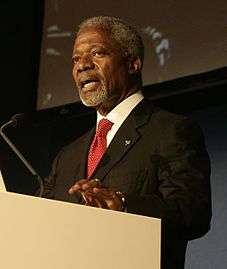
Over the course of its history, a sizeable number of UNIGE alumni have become notable in their fields, both academic, and in the wider world. Affiliates of the University of Geneva have won 10 Nobel prizes. Graduate alumni (Martin Hairer and Vaughan Jones) have won 2 Fields Medals.
The University has hosted several Nobel laureates as students, researchers and/or professors: Norman Angell (1872–1967), Nobel Peace Prize 1933; Karl Gunnar Myrdal (1898–1987) Nobel Prize in Economic Sciences 1974; Daniel Bovet (1907–1992), Nobel Prize in Medicine 1957; Niels Kaj Jerne (1911–1994), Nobel Prize in Medicine 1984; Maurice Allais (1911–2010), Nobel Prize in Economic Sciences 1988; Edmond H. Fischer (1920–), Nobel Prize in Medicine 1992; Martin Rodbell (1925–1998), Nobel Prize in Medicine 1994; Alan Jay Heeger (1936- ), Nobel Prize in Chemistry 2000; Werner Arber (1929– ), Nobel Prize in Medicine 1978; Kofi Annan (1938– ), Nobel Peace Prize 2001.
It has also hosted or graduated three Fields medal laureates: Vaughan Jones (1952– ), Fields Medal laureate in 1990, Stanislav Smirnov (1970– ), Fields Medal laureate in 2010 and Martin Hairer (1975- ), Fields Medal laureate in 2014.
Notable scholars
- Werner Arber (1929-)
- Jonathan Barnes (1942-)
- Roland Barthes (1915–1980)
- Samuel Baud-Bovy (1906–1986)
- Yves Bonnefoy (1923-)
- Raymond Boudon (1934-)
- Jacques Bouveresse (1940-)
- Bernard Bouvier (1861–1941)
- Bertrand Bouvier (1929-)
- François Bovon (1938-)
- Michel Butor (1926-)
- Edouard Claparède (1873–1940)
- Georges Cottier (1922-)
- Gabriel Cramer
- Victoria Curzon-Price (1942-)
- Waldemar Deonna (1880–1959)
- Kuppamuthu Dharmalingam (1949-)
- Alfred Dufour (1933-)
- Jean-Pierre Eckmann (1944-)
- Pascal Engel (1954-)
- Georges Favon (1843–1902)
- Øystein Fischer (1942-2013)
- Théodore Flournoy (1854–1920)
- Bernard Gagnebin (1915–1998)
- Orio Giarini (1936-)
- Marcel Golay (1927-)
- Jeanne Hersch (1910–2000)
- Bärbel Inhelder (1913–1997)
- Albert Jacquard (1925-)
- Jean Kellerhals (1941-)
- Hans Kelsen (1881–1973)
- Stephan Klapproth (1958–)
- Ulrich K. Laemmli
- Jan-Erik Lane (1946-)
- Michel Léonard (1949-)
- Alain de Libera (1948-)
- Giorgio Malinverni (1941-)
- Michel Mayor (1942-)
- Franklin Mendels (1943–1988)
- Hans Morgenthau (1904–1980)
- Kevin Mulligan (1951-)
- Robert Mundell (1932-)
- Joseph Nye (1937-)
- Douglass North (1920-)
- Carlo Ossola (1946-)
- Jean Piaget (1896–1980)
- Jean Pictet (1914–2002)
- Olivier Reverdin (1913–2000)
- André Rey (1906–1965)
- Gonzague de Reynold (1880–1970)
- Georges de Rham (1903–1990)
- Anik de Ribaupierre (1946-)
- Denis de Rougemont (1906–1985)
- Jean Rousset (1910–2002)
- Ferdinand de Saussure (1857–1913)
- Klaus Scherer (1943-)
- Klaus Schwab (1938-)
- Jean de Serres (1540 - 1598)
- Stanislav Smirnov (1970-)
- Jean Starobinski (1920-)
- Maurice Stroun (1926-)
- George Steiner (1929-)
- Ernst Stueckelberg (1905-1984)
- Carsten Peter Thiede (1952–2004)
- Pierre Weiss (1952-)
- Chaim Weizmann (1874–1952)
- Éric Werner (1940-)
- Jean Ziegler (1934-)
Notable alumni
- Henri of Luxembourg (HEI)
- Maria Teresa Mestre
- Astrid de Belgique (IUEE)
- Joséphine-Charlotte de Belgique
- Nora of Liechtenstein (HEI)
- Elias Farah
- Emanuele Filiberto di Savoia
- Bonaya Adhi Godana
- Hartley Shawcross, Baron Shawcross
- Sir Norman Angell
- Kofi Annan (HEI)
- José Manuel Durão Barroso (IUEE)
- Ferdinand P. Beer
- Manolo Blahnik
- Nicolas Bouvier
- Micheline Calmy-Rey (HEI)
- Antoine Alfred Désiré Carteret
- Corinne Chaponnière
- André Chavanne
- Henry Chrouet
- Ruth Dreifuss
- Georges Favon
- Ian Fleming
- Claude Goretta
- Christian Grobet
- Martin Hairer
- Jean Hoerni
- Afet İnan
- Sandra Kalniete
- Sophie Kanza
- Lazare Kopelmanas
- Zygmunt Krasiński
- Dominique Lévy[51]
- Gilles Marchand
- Alain Morisod
- Serge Moscovici
- Placide Nicod
- Claude Nicollier
- Jean Pictet
- Emma Pieczynska-Reichenbach
- Claude Piron
- Hans-Gert Pöttering
- Darius Rochebin
- Nasser Mohammed Al-Ahmed Al-Sabah
- Marco Solari
- Manuel Tornare
- Claude Torracinta
- Gérard Zinsstag
- Jürgen Wöhler
- Ehsan Naraghi
- Georg Seelig
- Sigmund Widmer
In fiction
- James Bond has briefly studied at the University of Geneva, as Ian Fleming did.[52]
See also
- List of early modern universities in Europe
- List of largest universities by enrollment in Switzerland
- International Academy of Sport Science and Technology (AISTS)
- myScience.ch
Notes and references
- 1 2 "University of geneva". Mastersportal.
- ↑ "University of Geneva". Talloiresnetwork Tufts.
- ↑ "University of Geneva (UNIGE)". Studying in switzerland.
- ↑ "University of Geneva honors LHC project leader at 450th anniversary ceremony". CERN. 5 June 2009.
- ↑ QS World University Rankings - 2011. Top Universities (2012-12-19). Retrieved on 2013-09-05.
- ↑ "University in the Spotlight: University of Geneva". Globalinksabroad.
- ↑ "L'Université de Genève a fêté ses 450 ans en 2009". Schenk photos.
- ↑ UNIGE - Plan d'accès aux bâtiments. Unige.ch. Retrieved on 2013-09-05.
- ↑ UNIGE - Plan d'accès aux bâtiments. Unige.ch. Retrieved on 2013-09-05.
- ↑ UNIGE - Plan d'accès aux bâtiments. Unige.ch. Retrieved on 2013-09-05.
- ↑ UNIGE - Plan d'accès aux bâtiments. Unige.ch. Retrieved on 2013-09-05.
- ↑ Facultés, école, UPER - Archives - UNIGE. Unige.ch (2009-09-03). Retrieved on 2013-09-05.
- ↑ http://www.topuniversities.com/universities/university-geneva
- ↑ University of Geneva Faculty of Medicine Official Website. https://www.unige.ch/medecine/fr/organisation/
- ↑ Webpage of the Art-Law Centre, http://www.unige.ch/cda
- ↑ Center for Biomedical Imaging (page visited on 2 October 2011).
- ↑ Centre universitaire romand de médecine légale (page visited on 3 June 2012).
- ↑ Institut universitaire romand de santé au travail (page visited on 1 October 2011).
- ↑ http://www.unige.ch/rectorat/static/budget-2013.pdf
- ↑ Uni Arve - Bibliothèque - UNIGE. Unige.ch (2013-06-25). Retrieved on 2013-09-05.
- ↑ Uni Bastions - Bibliothèque - UNIGE. Unige.ch (2013-07-08). Retrieved on 2013-09-05.
- ↑ Uni CMU - Bibliothèque - UNIGE. Unige.ch (2013-06-25). Retrieved on 2013-09-05.
- ↑ Uni Mail - Bibliothèque - UNIGE. Unige.ch (2013-08-20). Retrieved on 2013-09-05.
- ↑ Journal n°77 - SERVICE DE COMMUNICATION - UNIGE. Unige.ch (2013-05-30). Retrieved on 2013-09-05.
- ↑ Perspectives - Service De Communication - Unige. Unige.ch (2010-09-07). Retrieved on 2013-09-05.
- ↑ http://www.unige.ch/dife/sinscrire/conditions-admissions/201314conditions_immatriculation.pdf
- ↑ Examen de français - Division de la formation et des étudiants - UNIGE. Unige.ch (2013-06-18). Retrieved on 2013-09-05.
- ↑ Studying/Doing research - International - UNIGE. Unige.ch (2013-02-08). Retrieved on 2013-09-05.
- ↑ Programme des Welcome Days 2013 - Accueil et intégration - UNIGE. Unige.ch (2013-08-12). Retrieved on 2013-09-05.
- ↑ Réforme de Bologne et système de crédits ECTS - Secteur Formation & Évaluation - UNIGE. Unige.ch (2010-10-13). Retrieved on 2013-09-05.
- ↑ Fiches Bachelors - Futurs étudiants - UNIGE. Unige.ch (2013-03-11). Retrieved on 2013-09-05.
- ↑ Au service des professionnels - Formation continue - UNIGE. Unige.ch. Retrieved on 2013-09-05.
- ↑ Règlement du Baccalauréat universitaire en Psychologie. Retrieved on 2016-09-29.
- ↑ http://www.unige.ch/international/Futuretudiant/etudiantregulier/whygeneva/Programmes_taught_in_english_dec.pdf
- ↑ http://129.194.40.25/fmi/iwp/cgi?-db=RI_Panorama&-loadframes
- ↑ http://www.unige.ch/gufri/index.html
- ↑ "Institut des Sciences de l'Environnement - Institut des Sciences de l'Environnement - UNIGE". Retrieved 20 July 2015.
- ↑ http://monet.knu.ac.kr/~cktoh/Newsweek-top-100.pdf
- ↑ "QS World University Rankings 2010 Results".
- ↑ "Times Higher Education World University Rankings".
- ↑ "Top European Institutions in Molecular Biology". Times Higher Education. Retrieved 20 July 2015.
- ↑ "University of Geneva Rankings". Top Universities. Retrieved 20 July 2015.
- ↑ "University of Geneva Rankings". Top Universities. Retrieved 20 July 2015.
- ↑ "Bureau des statistiques - Bureau des statistiques - UNIGE" (PDF). Retrieved 20 July 2015.
- ↑ http://www.sports.unige.ch/index.php/calendrier-a-horaires
- ↑ http://www.sports.unige.ch/index.php/championnats/20-championnats-universitaires-genevois
- ↑ http://www.sports.unige.ch/index.php/championnats/38-championnats-universitaires-ch
- ↑ http://www.sports.unige.ch/index.php/sport-etudes
- ↑ http://alumni.unige.ch/services-avantages.html
- ↑ "Atouts Lettres - Présentation". Retrieved 20 July 2015.
- ↑ "Dominique Levy". Dominique-levy.com. Retrieved 8 May 2014.
- ↑
- Pearson, John (2008). James Bond: The Authorised Biography. Random House. ISBN 978-0-09-950292-0. , p. 299
External links
| Wikimedia Commons has media related to University of Geneva. |
- Official website
- Faculty GSEM
- Official website (French)
- University of Geneva in the Rankings
- International Academy of Sports Science and Technology (AISTS)